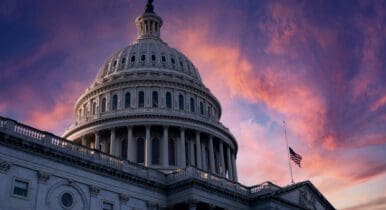Consultants Speak Out About Mental Health Challenges: ‘This Cycle Is Rough’

A prominent Democratic strategist is opening up about his struggles with mental health as practitioners on the left gather in Chicago for the start of the Democratic National Convention.
Mike Nellis, founder of Authentic, told C&E that he’s recently found himself battling online trolls attacking him for speaking publicly about his struggles with mental health, which includes suicidal ideation.
It’s one of the reasons why he was willing to address not just his own challenges, but what the campaign industry overall is getting wrong when it comes to mental health.
For instance, largely absent from the dialogue around a cycle that will be historic for a number of reasons is a conversation about the toll such a vitriolic campaign is taking on practitioners — particularly for those who spend their workdays online.
“These are really hard jobs,” Nellis said. “No matter whether you’re left or right, or in between, you’re usually not getting paid enough. You don’t have enough resources to do your job. You don’t have enough people to do the work that you want to do. And so we all get overwhelmed and burned out really quickly.
“And what happens in the space is that people borrow from our passion for the work that we’re doing on the issues that we care about — at the expense of our mental health.”
The lack of dialogue in the industry is what prompted Nellis to start highlighting his own experience on his social media channels.
“I’m not sure that there is a strong enough conversation being had here, which is part of the reason I want to share my own personal journey,” he said.
Posts like this one, he said, have become a creative outlet to help him handle the stress that’s come with the ’24 cycle.
“The first 10-15 years of my career, I dove headfirst into whatever anybody would be willing to give me — at the expense of my physical health and my mental health and not dealing with anxiety and depression,” he said. “And what I was really doing was disassociating from how I was feeling because I didn’t have any coping mechanisms or understanding of what was going on with me.”
Now, what’s made things worse for practitioners is that the driving force behind online engagement has become so-called outrage porn.
“If you’re just trying to drink from the fire hose 24 7, it’s impossible,” he said. “I think both political parties have strategists and activists who are just way too online and are just not living in the real world. … The more that I have tried to root myself in the real world and not the internet, the better my mental health has been, the better my connections to my family and my friends have been. And I think more people need to do that.”
He aded: “Social media is designed to divide us.”
It’s not just Democratic consultants who are worried about their and their team’s mental health. Wesley Donehue, founding partner, Push Digital, called 2024 the “the worst” he’s experienced.
“This cycle is rough,” he said. There’s a lot of negativity, [which is] out of our control, so we have a zero tolerance policy against negativity that is in our control: We eliminate toxic clients and teammates.”
While in off-years, Push has a no-limit on vacation days, Donehue said there isn’t a specific mental health policy for on-cycle employees.
“We’re just completely flexible with our teammates and do what we have to do to support them,” he said.
Meanwhile, Nellis said that it’s too difficult to have an industry-wide conversation around mental health during a presidential, but it should be a priority for firm owners and leaders in the industry after November.
“I think post-election, we need to have like a deeper conversation about how we’re structuring our teams and our workplaces so that we can retain people. There is a huge talent drain in the Democratic and Republican parties.”



